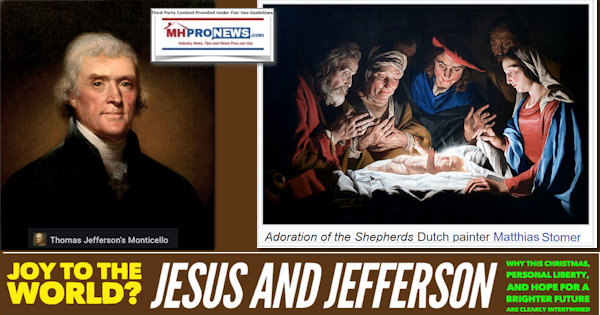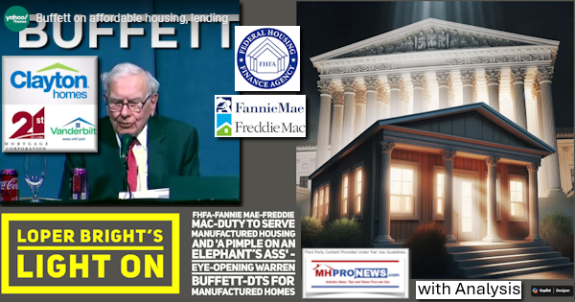Christmas is an ever-relevant event. Why? Let’s examine a few thoughts that make that point, weaving together some quotes from founding father, statesman, and third U.S. President Thomas Jefferson. Jefferson has many notable remarks. One of them Monticello says is that “Eternal vigilance is the price of liberty.” Jefferson wasn’t Christian in the normal sense. He disparaged the apostles and others – he was aptly known as a deist. But Jefferson nevertheless had great respect for Jesus. He created a book of what he thought were the authentic collection of Jesus’ sayings. To explain the relevance of Jesus’ thoughts, Jefferson said in part: “Of all the systems of morality, ancient or modern which have come under my observation, none appears to me so pure as that of Jesus….I am a real Christian, that is to say, a disciple of the doctrines of Jesus.”
So said Jefferson, who according to Inspiring Quotes also said the following about Jesus of Nazareth, believed by billions to be the Christ, the long-awaited Messiah and Savior.
- “The doctrines of Jesus are simple, and tend to all the happiness of man.”
- “I believe in both a creative and personal God, a divinely ordered universe, that man has an innate moral sense, and that Jesus was a great moral teacher, perhaps the greatest the world has witnessed.”
- “That Jesus did not mean to impose himself on mankind as the son of God, physically speaking, I have been convinced by the writings of men more learned than myself in that lore.”
Jefferson was the primary author of the U.S. Declaration of Independence, which declared: “We hold these truths to be self-evident, that all men are created equal, that they are endowed by their Creator with certain unalienable Rights, that among these are Life, Liberty and the pursuit of Happiness.” He believed that the Bible had been corrupted as was the Christian faith.
Before and since, others have made similar accusations that the authentic teachings of Jesus had been corrupted.
To briefly examine that assertion, is this paraphrase of what former atheist turned Christian believer and famous author C. S. Lewis. Jesus is either Lord, liar, legend, or lunatic. Said Lewis: “A man who was merely a man and said the sort of things Jesus said would not be a great moral teacher. He would either be a lunatic — on the level with the man who says he is a poached egg — or else he would be the Devil of Hell.”
Citing Lewis, Evidence Unseen notes: “During his life, Jesus asked his disciples: “Who do you say that I am?” (Mt. 16:15) Two thousand years later, modern people are still asking the same question. Was Jesus a Liar, Lunatic, Legend, or Lord (LLLL)?”
Writers from various branches of Christianity have unpacked each of those four LLLL inquiries using a mix of Scripture, science, and history. For example, for those who inaccurately try to claim that Jesus was merely a legend, there is more historic evidence (including but also beyond the Biblical books) than any ancient personality. Denying the historic Jesus would be harder than denying Julius Caesar, Cleopatra, one of the pharaohs, Moses or a range of historic figures that are rarely if ever seriously suspected of having lived.
The question of Jesus being a liar or lunatic are raised by skeptics precisely because on several occasions he claimed to be equal to God (the Father). The Gospels are packed with miracles performed by Jesus, including feeding thousands, raising the dead to life, and freeing the possessed from the power of the devil.
The Acts of the Apostles and other books relate miracles that occurred at the hands of Jesus’ followers, who acted with power by calling on the name of Jesus.
Well evidence miracles have been recorded numerous times since the time of Christ down to our own day. Perhaps one of the most publicly witnessed miracles – which was also predicted before hand – was the “Miracle of the Sun” that occurred in Fatima, Portugal in 1917. That event – where the sun ‘danced’ – was witnessed by an estimated 70,000 to 100,000 people and made newspapers around the world. Several of those witnesses were atheists or agnostics who saw what believers witnessed.
A newspaper article from October 1917 with eyewitness reports of the Miracle of the Sun at Fatima, the greatest miracle of modern times.
(from the ‘Illustração Portuguesa’, a weekly magazine, published by the Portuguese newspaper O Século) pic.twitter.com/gHw6H2nzuo
— Catholic Sat (@CatholicSat) October 13, 2020

As to the reliability of the Biblical books, there are tools and resources available today that did not exist during the time of Jefferson. Jefferson thought, as do several other doubting groups, that the Bible had been corrupted. But when the Dead Sea Scrolls and other biblical fragments are compared to the modern texts, they reveal a surprising reliability, rather than a corruption or elaboration. For centuries, monks’ hand-copied books before the Guttenberg printing press were developed. Put yourself into a monks’ shoes for a few moments. Copying God’s word was an honorable and important work. Monks copied the biblical texts with care, precisely because they believed. So, is it any surprise that when comparing ancient copies with modern discoveries they routinely reveal reliability, not a lack of it?
Christmas
But let’s look at Christmas more specifically.
The late Archbishop Fulton Sheen, in his renowned video and audio series, “Life is Worth Living” was popular with non-Catholic Christians, Jews, and people of other or no faith, beyond Catholic Christians. His blend of history, wit, Scripture, and other literature revealed his legendary intellect. He routinely spoke without notes or a teleprompter. He timed the ending of his live television presentations with remarkable accuracy. Sheen made the case in one talk that the least that God could do is pre-announce the coming of his Messiah. Of all the religious figures since the dawn of human history, prophecies that were made hundreds of years before the coming of Christ fit remarkably with the events of Jesus’ life, including his birth in Bethlehem.
The Bible doesn’t use the word “Trinity.” But there are several examples of the Trinitarian nature of God, starting in the book of Genesis and through the books of the New Testament. One of God’s titles was El Elohim, which even secular and left-leaning Wikipedia indicates God in a plural meaning. “Although the word [El Elohim] is plural in form…” In Genesis 18, there are three visitors to Abram, who was later renamed Abraham. Abraham worshiped these three. “18 The Lord appeared to Abraham near the great trees of Mamre while he was sitting at the entrance to his tent in the heat of the day. 2 Abraham looked up and saw three men standing nearby. When he [Abraham] saw them, he hurried from the entrance of his tent to meet them and bowed low to the ground.” As Patrick explained it, using the shamrock of three leaf clover, God was unity – one – with three distinctive ‘persons’ commonly described as Father, Son, and Holy Spirit.
So, God pre-announced this coming of the Christ centuries before his miraculous birth to a virgin girl named Mary [Miriam]. Jesus performed great signs and wonders. While it is obvious that not every prayer is answered with a ‘yes’ from God, some are answered and at times in a miraculous manner. This is something our family has personally experienced, as has others. As to prayers that are not answered with a yes or quickly, people are taught to trust that God has the best of reasons. Lazarus, for instance, was allowed to die so that he could be resurrected to reveal the power of Christ.
Many have their own personal accounts of miracles. We hold ourselves in that group, as God granted a miracle to our son (more than one, actually). That exercise of God’s power is not because of the quality of our own life. God’s power is not limited by human weakness or sinfulness. So, the prayers of sinners do get answered.
Indeed, Scripture tells us that all of God’s followers (with a pair of notable exceptions…) were sinners who failed to do what God asked, even after those followers may have personally been given some great or miraculous gift. Solomon, David, Peter, Paul all sinned. Of all of the 12 disciples or Apostles of the Lord Jesus, only one – the youngest, John – did not desert him when the Christ was arrested, tried, and crucified in atonement for the sins of humanity.
Indeed, the purpose of the coming of Christ was precisely to save humanity from millennia of slavery to sin and its consequences. God gave Adam and Eve free will. It is not God’s fault that the first parents, and by extension the bulk of the rest of humanity – chose to abuse that freedom. Parents conceive and raise a child knowing that the child will never be perfect. But still, there is routinely great love for imperfect children. We love our spouses or others, despite their imperfections.
Why This Christmas Is Important
Our era may be among the greatest threats to the freedom of humanity. There are contradictory claims that are routinely occurring between this or that faction.
One of the surest ways to test something being told is to sift out the wheat from the chaff using the divine principles taught by the Ten Commandments and the words of Jesus.
You don’t have to be a scripture scholar, nor a historian, to realize that much of human history is the tale of one person or group trying to oppress others.
At the core of such oppression is routinely a serious lack of Christian behavior.
All the laws in the world won’t make people moral. Founders George Washington, and Thomas Jefferson recognized that morality often flowed from religious convictions.
Even though Jefferson mistakenly thought that Jesus was merely a good teacher, he still recognized that Jesus’ teachings were the most sublime he had ever encountered.
In the run up to this Christmas, this writer submitted an article to the Baptist News Global, which was published in the link below.

It makes several points. But among them is that Christmas – which is an ancient contraction that means Christ’s Mass, the liturgical celebration of the Messiah’s birth – is an ongoing reminder that we need redemption. We must “make room” where there was “no room.”
Authentic and sustainable human freedom is found in Christ and the following of Christian teaching through the sought-after gift of freely given grace. Jesus Himself noted that humanity, including his own disciples, would still sin. But the Church has been compared to a hospital for sinners. We all need that specialized care that God gives us through the person of his co-eternal divine son, Jesus.
Our friends, family, and colleagues include atheists, agnostics, Muslims, Jews, LDS, and one of the range of Eastern religions, among others. Most are from one of the branches of Christianity. None of us mere mortals are perfect. But that is why we should be humble and turn to our redeemer for salvation.
It is the proud who are overcome by the humble when the prayerfully act in accord with the Divine will. As the ancients used to say, ora et labora. Prayer and work.
Victories from the past and present, the Biblical accounts remind us, are not always fast or even immediately obvious. But time and again, often in amazing ways, the meek who seek in sincerity to embrace the teachings of Jesus through grace are saved time and again from drowning in our respective sins. It is not without reason that there are two distinctive examples in the Gospels of the disciples – several of whom were experienced fishermen – when they needed to be saved from a storm on the waters. We need to be saved every time we fall.
Thankfully, in the beautiful images of Christmas, we see the humble and the wise seeking Him. Jefferson pointed to God and Jesus. Each claimed a stand for authentic human liberty.
Emmanuel “God is with us.” God is also called “Yeshua” – “God Who Saves.” The meekest, lowly shepherds, and the wise men alike sought Jesus. As Jefferson said, “The doctrines of Jesus are simple, and tend to all the happiness of man.” The same that was true then is true now. No wonder the Bible tells us that upon his birth the angels sang, “Glory to God in the Highest! And on earth, peace to people of good will.” So may it ever be, amen. ##





































